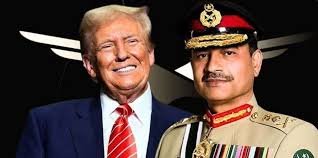Tahir Maqsood Chheena
The sheduled meeting between US President Donald Trump and Pakistan’s Chief of Army Staff, Field Marshal Syed Asim Munir, is more than a symbolic gesture—it is a strategic engagement occurring at a moment of regional volatility and global uncertainty. With the Iran-Israel conflict intensifying and the geopolitical map of the Middle East being redrawn by military force, this high-level interaction provides Pakistan with an essential diplomatic lever to navigate its multi-dimensional challenges.
The timing of the meeting is crucial. Seventeen months after Pakistan and Iran exchanged missile fire along their shared border, and in the midst of unprecedented Israeli strikes on Iranian nuclear facilities, Pakistan is walking a diplomatic tightrope. Its interests with Iran are both geographical and ideological—shared borders, trade routes, religious connections, and energy needs bind Islamabad to Tehran. Conversely, Pakistan cannot afford to overlook the strategic significance of its ties with the United States, especially as Washington maintains a deeply entrenched alliance with Israel. The Trump-Munir meeting places Pakistan at the centre of this regional chessboard, where neutrality is no longer an option and strategic clarity is urgently required.
Field Marshal Munir’s presence in Washington, and Trump’s willingness to host him at such a critical juncture, signals recognition of Pakistan’s growing importance in regional stability and global counterterrorism. For Pakistan, this is an opportunity to project itself as more than a reactive power—it can be a proactive voice in matters of peace, de-escalation, and mediation. Issues such as the unresolved Kashmir dispute, the humanitarian catastrophe in Gaza, and the growing threat of a regional war between Iran and Israel demand Pakistan’s principled stance. Munir’s role, therefore, is not limited to military diplomacy; it carries the burden of regional advocacy.
Critically, this engagement also reflects Pakistan’s attempt to reposition itself on the global stage. The war in Gaza, which has claimed tens of thousands of Palestinian lives, has evoked strong emotions across Pakistan. Similarly, Israel’s aggression towards Iran raises alarms for Pakistan’s own western security corridor. In this context, Munir’s meeting with Trump provides a platform to voice concerns over unchecked militarism, call for immediate ceasefires, and promote adherence to international norms. This is particularly significant given Pakistan’s nuanced position—neither hostile to Iran nor allied with Israel, but deeply affected by instability in the region.
Furthermore, Pakistan’s counterterrorism cooperation, particularly against IS-K and other transnational threats, is another pillar of shared interest that this meeting could reinforce. Trump’s endorsement of Pakistan’s role in recent high-value captures and extraditions adds credibility to Islamabad’s narrative of being a responsible security actor, not a liability. Field Marshal Munir’s emphasis on global counterterrorism cooperation, especially within the South-Central Asian belt, could help secure long-term security partnerships that extend beyond aid and optics.
The Trump-Munir dialogue also reflects a changing dynamic in Pakistan’s approach to diplomacy. Historically reactive, Pakistan is now signalling a desire to engage with global powers not from a place of crisis, but as a state with its own strategic agency. This includes raising humanitarian issues like the repatriation of Dr. Aafia Siddiqui, advocating for UN resolutions on Kashmir, and resisting the normalization of Israeli impunity in Gaza—all of which would resonate within segments of the American political spectrum and beyond.
In essence, the Trump-Munir meeting must be viewed as a diplomatic inflection point. Whether or not it yields immediate policy shifts, it enables Pakistan to assert a narrative of strategic relevance, moral clarity, and regional responsibility. In an era of fragmented alliances and volatile borders, this engagement is a rare chance for Pakistan to shape outcomes rather than absorb consequences.
















